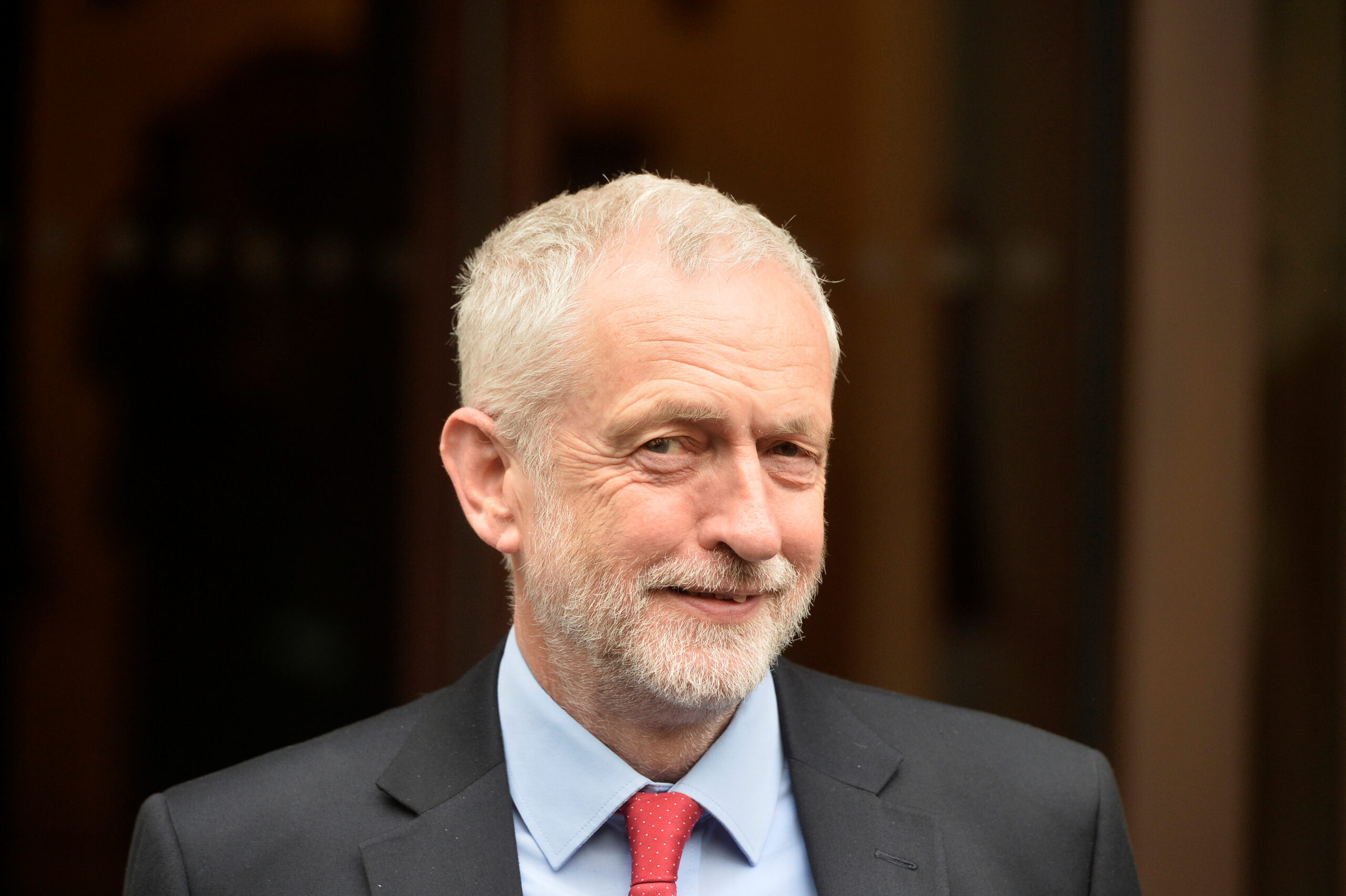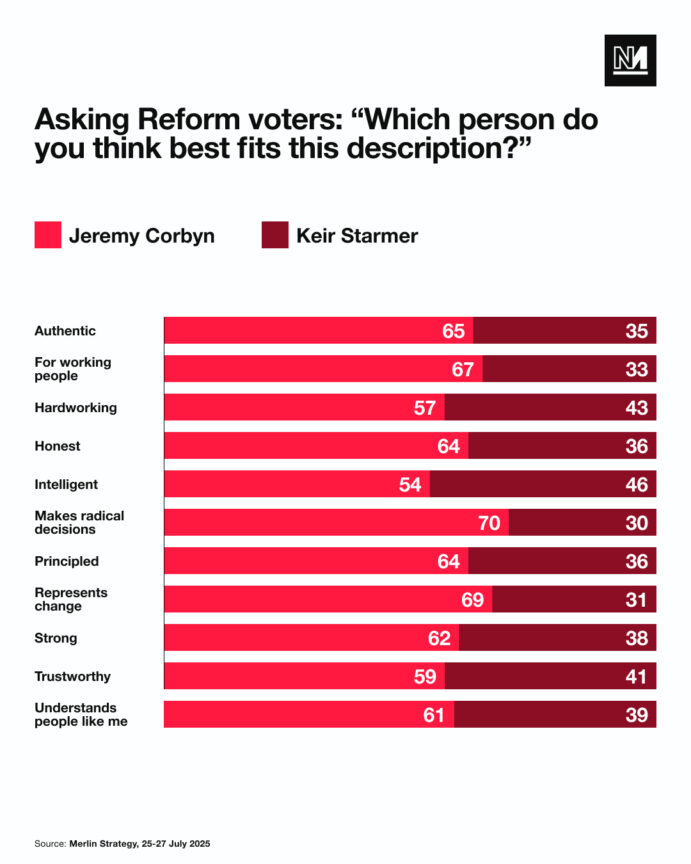Reform Voters Prefer Corbyn to Starmer on Almost Every Metric, New Polling Shows
They’re not buying Farage Lite.
by Rivkah Brown
30 July 2025

Polling of 2,000 UK adults has shown that Jeremy Corbyn outperforms Keir Starmer on almost all metrics among Reform voters.
The polling, conducted by Merlin Strategy from 25-27 July and seen exclusively by Novara Media, indicates that the 476 respondents who currently intend to vote Reform believe that Corbyn better understands people like them and is braver and more principled than the prime minister, who expelled his predecessor from the party last year.
 The results will not surprise Labour, whose leader is widely disliked by the right and far-right for his perceived inaction on immigration, despite his attempts to woo them with increasingly hardline anti-immigration positions. However, it might surprise Labour strategists that Starmer’s mimicry of Nigel Farage has backfired so badly – and that Reform voters prefer a man considerably to his left.
The results will not surprise Labour, whose leader is widely disliked by the right and far-right for his perceived inaction on immigration, despite his attempts to woo them with increasingly hardline anti-immigration positions. However, it might surprise Labour strategists that Starmer’s mimicry of Nigel Farage has backfired so badly – and that Reform voters prefer a man considerably to his left.
“This polling blows a hole in Starmer’s strategy,” independent MP Zarah Sultana told Novara Media. “He’s spent years chasing Reform voters, echoing their rhetoric, even mimicking Enoch Powell. And for what? They still prefer Jeremy Corbyn.”
The poll comes at a bad time for the Labour party, which is facing an imminent Corbyn-shaped threat. On Thursday, Corbyn and Sultana jointly announced the launch of their new party, inviting members of the public to participate in a founding conference to decide the party’s name and policy platform. Within three days, over half a million people had reportedly registered their interest. Polling suggests the party could take 9% of Labour’s vote-share and gain level pegging with the Tories.
Responding to the poll, Corbyn told Novara Media: “The Labour government is here to appease Reform. We are here to defeat Reform.”
The Merlin Strategy poll asked respondents to say which of the two politicians best fit several characteristics, including being hardworking, honest, strong, fun, trustworthy, brave, caring, intelligent, principled and authentic. They were also asked to say which of the men better represented change, represented Labour voters, who better understood people like them and made radical decisions.
Among Reform voters, Corbyn beat Starmer on all the positive measures, except one: Reform voters believe Starmer is better on the world stage.
61% of Reform voters felt Corbyn understood people like them, versus 39% for Starmer. 64% felt Corbyn was more honest, versus 36% who felt Starmer was. 62% felt Corbyn was stronger, versus 38% for Starmer. 64% felt Corbyn was principled, versus 36% for Starmer.
The widest gap between the two men was on representing change, where Reform voters preferred Corbyn to Starmer by 38 points (Starmer’s 31% to Corbyn’s 69%); and making radical decisions, where Corbyn had a 40-point lead (Corbyn’s 70% to Starmer’s 30%).
The new polling suggests that Corbyn’s appeal extends far beyond the young and leftwing voters with whom he is normally associated, and includes far-right and “red wall” voters he was assumed to have lost. The polling also suggests that Starmer’s attempt to woo these voters with increasingly reactionary positions has not worked.
In response to the poll, Corbyn told Novara Media: “People have lost faith in a political system that shuts them out of the decisions that affect their daily lives.
“The great dividers want you to think that migrants and minorities are responsible for the problems in our society. They’re not. Those problems are caused by a rigged economic system that protects the interests of billionaires and corporations.”
Animosity between Starmer and far-right voters intensified during the racist riots of last summer, sparked by misinformation about the perpetrator of a stabbing in Southport. The riots, which Starmer described as “thuggery” and which saw almost 500 rioters arrested and over 100 charged, produced the term “two-tier Keir” to describe Starmer’s supposedly inconsistent policing of migrants and anti-immigration protesters.
Starmer has sought to woo Reform voters by offering an increasingly colourful array of anti-immigration rhetoric and policies.
At a press conference in May, the prime minister said the UK was at risk of becoming an “island of strangers” due to migrants’ lack of integration into their adopted country. The speech was widely compared, including by Labour backbenchers, to Enoch Powell’s infamous “rivers of blood” tirade, in which the Conservative MP warned that immigration would make white people “strangers in their own country”. Starmer later said he “regrets” the speech and hadn’t intentionally echoed Powell. Shabna Begum, chief executive of the racial justice thinktank the Runnymede Trust, claimed that Starmer had made a “calculated choice to use Powellite” language.
In June, Labour U-turned on the grooming gangs enquiry following far-right pressure that falsely emphasised the supposedly ethnic minority demographic of the gangs. Labour has also sought increasingly creative ways to crack down on illegal migration, most recently a partnership with food delivery companies to track down riders residing at asylum accommodation.
The new polling suggests this charm offensive isn’t washing with Reform voters. “Starmer’s rightward drift isn’t winning over Reform and it’s alienating Labour’s base that he’s taken for granted,” said Sultana. “It’s time for a new kind of politics – and Jeremy, I and millions of others will be offering exactly that.”
Polling suggests Corbyn and Sultana’s new party could shake up Britain’s two-party parliamentary system from the left, much in the way that Reform has from the right. YouGov polling suggests that 18% of Britons would consider voting for a Corbyn-led leftwing party despite it having no name or policies. Sultana has described this figure as “a floor, not a ceiling”, saying she wants the party to aim for up to a quarter of the popular vote. Another poll by More in Common, published by the New Statesman, found that Corbyn could take 10% of the vote and finish first among 18-24-year-olds.
The Labour party did not respond to Novara Media’s request for comment.
Rivkah Brown is a Novara Media commissioning editor and reporter.


